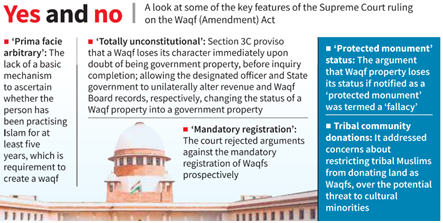

20th September 2025 (16 Topics)
Context:
The Supreme Court temporarily stayed certain provisions of the Waqf (Amendment) Act, 2025, while upholding other key changes in the law.
Waqf (Amendment) Act, 2025:
Context & Background
Definition of Waqf:
- Permanent endowment of movable or immovable property by a Muslim for religious, charitable, or pious purposes.
- Managed by a Mutawalli to ensure income is used as intended (mosque upkeep, madrasa, charity).
- The Waqf (Amendment) Act, 2025 introduced comprehensive changes in Waqf property management, registration, and governance.
- Multiple petitions (~65) were filed challenging the Act’s constitutional validity, consolidated before the Supreme Court.
- Nearly 65 petitions from MPs and political parties challenging constitutional validity.
- Grounds: Violation of Article 26 (right to manage religious affairs), autonomy of Muslim community, and property rights.
Supreme Court Interim Order
- Nature of Interim Relief:
- No blanket stay; only select provisions temporarily stayed while the Act largely remains operational.
- Principle: Under Article 13(2), only provisions contravening fundamental rights are void; rest of the law can continue.
Key Provisions Stayed:
- Powers of District Collectors (Section 3C)
- DCs could declare Waqf property as government property during inquiry.
- Stay reason: Prima facie arbitrary; violates separation of powers.
- Interim safeguard: Waqf properties retain status; no dispossession or third-party rights until Tribunal adjudication.

- Inclusion of Non-Muslims in Waqf Boards
- Original law allowed a non-Muslim majority in Waqf Boards/Central Waqf Council.
- SC capped representation:
- Central Waqf Council (22 members): max 4 non-Muslims.
- State Waqf Boards (11 members): max 3 non-Muslims.
- Rationale: Prevent infringement of community’s right to self-management.
- Five-year Rule for Practising Muslims
- Provision: Only Muslims practising Islam for ?5 years can create Waqf.
- Stay until the government frames rules to define “practising Muslim”.
Provisions Not Stayed
- Abolition of “Waqf by Use”
- Concept allowed properties used long-term for religious/charitable purposes to be Waqf without formal registration.
- Court found no prima facie ground to stay its prospective abolition.
- Applicability of Limitation Act
- Previously excluded under 1995 Waqf Act; now claims must follow general limitation periods.
- SC observed this corrects earlier discrimination; provision continues.
Significance of Interim Order
- Balances religious freedoms and government regulatory oversight.
- Prevents arbitrary dispossession while ensuring Waqf disputes are adjudicated by Waqf Tribunals.
- Provides clarity on non-Muslim participation limits in governance.
- Reinforces separation of powers and procedural safeguards.
Key Legal & Policy Analysis
- Constitutional Dimensions:
- Balancing Article 26 rights and government oversight.
- Ensures separation of powers by limiting arbitrary action by DCs.
- Protects minority rights while preventing misuse of Waqf provisions.
- Policy Implications:
- Formal registration improves accountability and prevents encroachments.
- Limitation Act application standardizes legal claims and prevents indefinite litigation.
- Inclusion of non-Muslims in Boards is limited to prevent erosion of community control, maintaining religious self-governance.
More Articles


